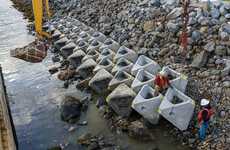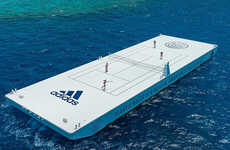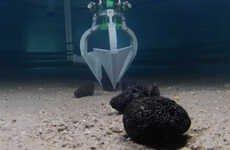
Does Practice of Ocean Dumping Recycle Old Steel Or Just Litter?
Katie Cordrey — February 20, 2009 — Eco
References: newsweek & greenupgrader
South Carolina has created more than 40 offshore artificial reefs in the waters off of its coast. The artificial reefs are popular destinations for recreational anglers and divers.
South Carolina’s offshore artificial reefs are made of scrap. Steel-hulled vessels are the most commonly used material in reef construction, but other recycled scrap materials include steel and concrete bridges, New York City subway cars, concrete culvert pipe, steel dry dock work platforms, and US Army tanks.
While proponents hail this as a green use of scrap metal, detractors claim it is wanton waste of steel that no country outside of the U.S. would consider wise. However, several other nations, including Malaysia, Brazil, Jordan, and Israel use a similar method of creating reefs from junk.
South Carolina’s offshore artificial reefs are made of scrap. Steel-hulled vessels are the most commonly used material in reef construction, but other recycled scrap materials include steel and concrete bridges, New York City subway cars, concrete culvert pipe, steel dry dock work platforms, and US Army tanks.
While proponents hail this as a green use of scrap metal, detractors claim it is wanton waste of steel that no country outside of the U.S. would consider wise. However, several other nations, including Malaysia, Brazil, Jordan, and Israel use a similar method of creating reefs from junk.
Trend Themes
1. Offshore Artificial Reefs - The practice of using recycled steel for offshore artificial reefs is gaining popularity and represents an opportunity for companies involved in steel production and recycling to expand into the marine industry.
2. Green Use of Scrap Metal - The controversy surrounding the use of scrap metal for artificial reefs highlights a need for innovative and sustainable solutions in the waste management and recycling industry.
3. Global Adoption of Artificial Reefs - The widespread use of artificial reefs for marine conservation and recreational activities presents an opportunity for businesses in the tourism industry to invest in sustainable ecotourism ventures.
Industry Implications
1. Steel Production and Recycling - Companies involved in steel production and recycling can capitalize on the growing trend of using recycled steel for offshore artificial reefs.
2. Waste Management and Recycling - The controversy surrounding the use of scrap metal for artificial reefs highlights a need for innovative and sustainable solutions in the waste management and recycling industry.
3. Tourism - The widespread use of artificial reefs for marine conservation and recreational activities presents an opportunity for businesses in the tourism industry to invest in sustainable ecotourism ventures.
3.3
Score
Popularity
Activity
Freshness























